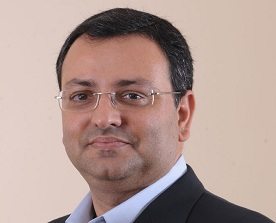Will Ratan Tata’s illustrious career in global brand acquisitions be carried forward by his heir Cyrus Mistry?
R. Chandrasekaran

CHENNAI: Leading industrialist and business tycoon Ratan Tata had quietly handed over the reins of the Tata Empire to Cyrus Mistry, by naming the latter as chairman of Tata Sons, which is controlling the Tata Group.
There cannot be any doubt that Tata has placed the Indian corporate on global space strongly; yet there is some agenda that he has left for his successor to do. Will Mistry take up the gauntlet? Indeed, there are tough challenges ahead for Mistry not only to maintain the brand name, but also extend and probe into areas where Tata wanted to but couldn’t advance.
It was a perfectly laid pitch for Ratan Tata when he took the reigns of Tata Sons, the flagship company for Tata Group companies, in 1991, just before the Indian government was forced to liberalize its economy. The second highest populated country faced a severe balance of payments crisis when P.V. Narasimha Rao assumed the office of the prime minister in May, 1991. The current Prime Minister, Manmohan Singh, was the finance minister then and had to open lots of avenues for both the domestic as well as global business houses to vie with each other and earn much needed foreign exchange for the country.
While the license regime came to an end following liberalization, there were boundless opportunities for entrepreneurs in the fields of aviation, communication, media and entertainment. The Tatas, who were responsible for creating Air India in 1932, wanted to fly in the domestic routes by exploring the open sky policy. The group had even struck a deal with Singapore Airlines in 1994. But the group had to ground its proposal since the government has rejected its proposal stating the existing carriers were enough to fly the domestic circuits.
It was Ratan’s predecessor, JRD Tata, who created Air India only to be taken over by the government 22 years later. The group had also tried to retrieve Air India from the clutches of the government in 2001, but the policy makers buckled under political opposition for divesting its stake to the Tata-Singapore Airline consortium. Therefore, the group’s interest in the aviation industry is quite understandable.
Though the current scenario might provide some solace to the ambitious group, Ratan Tata’s disclosure a couple of years back clearly indicated the frustration he had to face in their efforts to get a license to fly domestically. He had even gone to the extent of saying that the group’s approach with the three prime ministers during the time of 1995, 1997 and 2001 failed to yield the expected results and on the contrary an individual demanded Rs.150 million.
Interestingly, in an interview to an Indian news agency, Press Trust of India (PTI), earlier this month, Tata indicated his hesitancy to fly afresh in the open sky given the unviable business proposition that exists currently. He cited the “destructive competition” in the sector that forbids him to explore the possibilities afresh now. However, now that the government has allowed foreign direct investment in the airline business, Mistry will be tempted to fulfill the wishes of his predecessor, if not immediately but at a later date.
There are also other areas that Tata had left behind for his successor to take a call. One such area is expanding the footprint in the hospitality business by acquiring the U.S. based Oriental Hotels, which has been eluding to come into the fold of the Tata-controlled Indian Hotels. Orient-Express Hotels, which was launched in 1971, operates 40 hotels, 2 river cruise ships, 6 luxury tourist trains and one iconic restaurant and watering hotel, apart from having an interest in the property development and real estate business. The Tata Group has about 7 percent stake in the U.S. chain of hotels and is trying to form an alliance with them only to be rebuffed time and again. The current unsolicited offer too failed to enthuse Orient-Express. The ball is now in Mistry’s court whether to sweeten the bid or probe other opportunities. This is a tough call before him involving more than $1.86 billion.
This is critical for the new chairman of India’s most valued group as 22 acquisitions have happened since the commencement of the millennium. The major acquisition was undoubtedly the Britain-based Tetley Tea Company in February 2000 that put the group firmly on the world map taking it to the second largest makers of packaged tea and tea products globally. The acquisition has also boosted the confidence of the group’s top executives to venture into similar possibilities. This landed them in acquiring a controlling stake in the Anglo-Dutch steel maker Corus Group for a sum of $12 billion in 2007.
Obviously, the acquisition of Corus has made even the once beta-noir of Ratan Tata and former chairman of Tata Steel, Russy Modi to laud the efforts to take the company in the right perspective. He was associated with Tata Steel, which was earlier known as TISCO, for about five decades before Tata brought the retirement age into practice. Modi termed Tata as a class act. This is a clear indication of what Tata means in the corporate sector earning accolades even from his foes. It was not a secret that both Tata and Modi were at the loggerheads on the retirement issue after the former became the chairman of Tata Sons.
Similarly, if the buyout of Daewoo Motors’ heavy vehicle unit in 2004 was an indication of its seriousness in its global presence, the Tata Group’s purchase of the then beleaguered Ford’s Jaguar and Land Rover demonstrated its willingness to take a few risks in venturing into premium car segment. In fact, Tata Motors’ financial performance is lifted by the JLR brands performance much against the embarrassment of the pessimism expressed by analysts in 2008 when the auto maker acquired the brands. The company is only struggling to hold on to its position in the domestic front with new arrivals from rivals threatening to upset the group’s arithmetic.
Cyrus Mistry will have much harder task ahead even as the group is gearing itself to launch six new passenger and 25 commercial vehicles in the first half of 2013. The company’s prominent launch in 2013 includes a likely 800 cc Nano to take on Maruti 800 and remove any misgivings on Nano’s 500 cc, which received several complaints of catching fire on the road. The slackening of the much talked about brand deserves a boost to lift its sluggish sales.
The group’s presence is wide, be it salt or software. Tata Consultancy Services, Asia’s largest software service provider, was overshadowed by Infosys, whose shares were listed on NASDAQ. However, the perception seems to have changed after TCS shares were listed on the Indian bourses. Today, it is a jewel on the crowning glory of the group. Mistry needs to expand its presence globally and reduce its dependence on the United States.
The group earned close to $100 billion in revenues recently marking the first conglomerate from India to achieve the psychological mark with over half of them from abroad. However, Tata wanted his successor to aim big and achieve $500 billion in the next decade. If Mistry could achieve this ambitious target, it will place the group alongside the U.S. based Wal-Mart or ExxonMobil.
When Ratan entered the Tata Sons, revenues were about Rs.100 billion and this has now grown by 43 times. This suggests a compound annual growth rate of approximately 19.6 percent in the 21-year period he was at the helm of affairs of the group. Significantly, profit jumped 51 times indicating a CAGR of about 20.6 percent. The group’s market capitalization of 30-odd listed companies is close to $825 billion, which is 33 times more compared to 1991, suggesting a CAGR of approximately 18 percent.
The potential areas of growth will be driven by the opening of retail and financial services. The group, which had Central Bank of India before being taken over by the government, will likely apply for a banking license through Tata Financial as and when the Reserve Bank of India entertains such a proposal from the private enterprises. The group is also poised to enter defense equipment manufacturing, for which it is exploring various options.
On the humane side, people still remember how Ratan Tata conducted himself at the time of 26/11 terrorist attacks on Taj group of hotels. He helped to evacuate his guests and employees from the hotel and provided the employees full salary when the hotel undertook to repair the damages caused by the terrorists’ attack.
The financial performance and the expansion of global presence clearly indicate that Tata has placed the company brand name flying on the world corporate map. This leaves Mistry with the giant task of taking to new heights the achievements notched by Ratan Tata. Despite him taking the group to higher levels, it is still behind Asian multinationals like L.G. Electronics or Samsung. Will Mistry take the group to match such Asian business conglomerates?
Prominent chartered accountant and HDFC chairman Deepak Parekh has confidence that the name of the Tatas will continue to surge under Mistry’s stewardship. He reportedly said, “I have seen and observed Cyrus Mistry since he was a boy, since HDFC has a long-standing relationship with the Shapoorji Pallonji group. Having seen him grow… grow in stature over the years, I am confident that he will be able to take the Tata Group to a higher level, both domestically and internationally.”
If Tata had the opportunity to take advantage of India’s economic liberalization policy, Mistry could take advantage to not only consolidate the gains achieved by his predecessor, but also expand the business horizons, especially in the wake of the fluid economic conditions the world is facing currently. While large scale global acquisition is not likely to be in the cards at least in the near future, there is every possibility of the group acquiring smaller companies and entering into new markets such as China and Africa.



